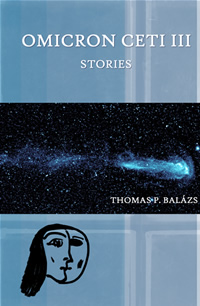Beginning with a Voice
It’s been a long road to publication for Thomas P. Balázs, but his new story collection is well worth the wait
Omicron Ceti III, the debut story collection from Chattanooga writer Thomas P. Balázs, might well come with a bit of fine print: No Trekkie affiliation required. Though the book’s title is indeed a nod to Star Trek that only devoted fans of that show are likely to recognize, the nine stories within do not tread speculative territory in any typical sense. Instead they deliver the reader into dark and quite disparate corners of this very real world. In “My Secret War,” for example, a gay boarding-school student stalks his English professor; in the title story, a young man in a psychiatric ward falls in love with a fellow patient; and in “April Paris,” a floundering Ph.D. student trades the University of Chicago for a squat in Greenwich Village and takes up with an infamous stripper.
To follow these and Balázs’s other, equally well-captured characters is to be alternately amused and disturbed—and always surprised. As wide-ranging as their subjects may be, the stories of Omicron Ceti III are linked by their characters’ fumbling, consuming desire for connection, and by the comic qualities that Balázs deftly draws out of their lonely and sometimes painful circumstances. Prior to the book’s launch at Winder Binder Books on February 20, Balázs answered questions from Chapter 16 via email.
Chapter 16: The nine stories in Omicron Ceti III are divided into three sections. Tell us a bit about the concept behind this structure.
Balázs: The tripartite structure is inspired by, and is an allusion to, the title-story’s obsession with counting in threes. Once you begin to count in threes, it starts becoming compulsive. You start noticing the number everywhere, and the book’s structure was, in part, a playful capitulation to that compulsion. It also provides a way of grouping stories thematically, or at least in terms of life-cycles, so that one may read the collected stories as representing three parts of the first half of life: youth, early- and mid-adulthood, with their attendant challenges and crises.
 The quotes from the Star Trek episode, “This Side of Paradise,” that introduce each section are meant further to evoke an underlying thematic unity: respectively, the striving to express love, the sacrifices required for maturity, and the rejection of facile solutions to the complex dilemmas of adulthood. Since the collection is not themed or interlinked, in the end, I hoped the structure would lend a kind of unity to what otherwise might be seen as disparate stories.
The quotes from the Star Trek episode, “This Side of Paradise,” that introduce each section are meant further to evoke an underlying thematic unity: respectively, the striving to express love, the sacrifices required for maturity, and the rejection of facile solutions to the complex dilemmas of adulthood. Since the collection is not themed or interlinked, in the end, I hoped the structure would lend a kind of unity to what otherwise might be seen as disparate stories.
Chapter 16: The title of the book refers to a fictional planet in the Star Trek series, which one character claims as “the planet I come from” in conversation with a hospital patient. Why did you choose this as the title for the collection? Were you concerned that readers wouldn’t get the reference?
Balázs: The first working title of this collection was My Secret War, and in many respects that’s a better title, more accessible, more resonant for most readers. By contrast, Omicron Ceti III functions almost as a kind of private joke. And at least one early reader of the collection counseled me against it since a) it misleadingly implied the collection was sci-fi, and b) the reference would be lost on the vast majority of readers.
Both of these critiques are valid (I figured a lot of reviews would start out by saying what a terrible title it is, but so far, that hasn’t happened). But in the end, I went for this title anyway for a number of reasons. First, and perhaps most importantly, it both reflected and seemed to justify the tripartite structure I was favoring (not only through reference to the story about counting in threes but through the happy coincidence of planet Omicron’s number). Secondly, the story “Omicron Ceti III” had, in some respects, been my most successful story to date. It was my first published story after my M.F.A. program, won a contest offered by Big City Lit, and had been twice anthologized, so it had been published, aptly enough, three times prior to its appearance in this collection. So I thought it deserved top billing. And finally, I just have warm feelings for that story and for the Star Trek episode to which it alludes, and ultimately it was to be my book, my first book, the one I would live with for the rest of my life. And, well, I just liked the title.
Chapter 16: Several stories in the collection are set in Chicago. Did that city’s literary scene in any way shape you as a writer?
Balázs: Honestly, I can’t say I was influenced by the “literary scene” in Chicago, so much as by Chicago itself, which is a great city, and which I consider to be my second home. I spent sixteen years of my life there, virtually all of my thirties, and a good part of my twenties and early forties. I got my Ph.D. there, made some of my best friends there, even met my wife there. It’s where I came of age as an adult, and I was pleased to pay it some tribute in my collection.
Chapter 16: The theme of sexual appetite—and, to varying degrees, deviancy—turns up a number of times in the book. Do you see sexuality as something that unites your narrators, who are otherwise vastly different individuals?
Balázs: I think sexual appetite links just about everyone, not just my characters—and maybe sexual deviancy too. I find sexual outliers fascinating because they operate at the margins of society but also within society, because they can operate under cover, and so embody a basic human predicament that requires us all to show a face to the outside world that doesn’t fully match our inside self. Even the most putatively “straight” person doesn’t reveal their sexual side to anyone but a select few—or maybe even just one other person. In that sense, everyone is in the closet. Moreover, despite all our “progress” as a culture, there’s still an awful lot of shame and ambivalence and hopeless contradictions intertwined with human sexuality, and so there are still lots of stories that remain to be told, and I guess I’ve seized some of those opportunities.
Chapter 16: On a related note, you’ve written seven of the nine stories in first person. What draws you to this point of view?
 Balázs: A lot of my stories begin with a voice. That is to say, I just start writing from the point of view of someone who has something to say and a particular way of saying it, and then I usually just stick with that first-person point of view. I haven’t really explored it consciously, but now that I think about it, I suppose that third person, for me, creates a kind of psychic distance between me and my characters, makes it more likely for me to pass judgment on them, maybe to satirize them, and that threatens, in my view, to interfere with my most basic desire as a writer, which is to humanize my characters.
Balázs: A lot of my stories begin with a voice. That is to say, I just start writing from the point of view of someone who has something to say and a particular way of saying it, and then I usually just stick with that first-person point of view. I haven’t really explored it consciously, but now that I think about it, I suppose that third person, for me, creates a kind of psychic distance between me and my characters, makes it more likely for me to pass judgment on them, maybe to satirize them, and that threatens, in my view, to interfere with my most basic desire as a writer, which is to humanize my characters.
Chapter 16: “Gourmand,” which centers on a man with an inexhaustible passion for exotic cuisine, is one of the collection’s most striking and surprising stories. Can you reveal anything about its origins?
Balázs: Well, one source of the story is simply my own taste for exotic foods and the reactions it has sometimes garnered. My culinary experiences are nowhere near as adventurous as the Gourmand’s, but even mild adventures into, say, kidneys in mustard sauce, have been greeted by fellow diners with questions, if not hysteria, and I have sometimes found that frustrating. A friend of mine still remembers the time I ordered octopus in Spain some twenty years ago, as if that were something extraordinary. So I just took this theme from my own experience and pushed it to the nth degree. And once I start pushing things, I sometimes don’t know when to stop.
Also, like the protagonist of that story, my father had an inordinate love of food and was himself a kind of gourmand. At his funeral, a colleague of his, a physician from China, a country with a reputation for an all-embracing attitude to comestibles, came up to me and said, “Your father loved food. He would eat things I wouldn’t eat.” “The Gourmand,” is also, therefore, a kind of homage to my dad and the love of all things edible that he passed on to me.
Chapter 16: I gather from the acknowledgments that this book has been years in the making. Tell us a bit about your journey as a fiction writer: what does the completion, and publication, of this collection mean to you?
Balázs: The collection has been years in the making, at least since 2003 when I finished my M.F.A. But more than that, it represents an important step for me in accomplishing a lifelong dream of being a professional writer, a dream I often postponed for other things—work, graduate school, video games. There were times when I very nearly gave up on the dream out of fear or despair, and I still struggle to stay on task, but at least now I have this collection in hand, and that means a lot to me. In some ways it’s a kind of snapshot of a significant period in my life, my early years as a “serious writer.” It’s something I’ll always carry with me, kind of like a tattoo, only no amount of laser surgery will ever get rid of it if it proves embarrassing later in life. It’s also important to me because now my stories will reach a wider audience. As one of my friends said to me recently, I’m crossing a bridge from the “private or semi-private” world of small literary-journal publications to a somewhat wider world. I like that. It’s a kind of second life not only for me, but for my stories. I’m pleased that I’ll get to share them with (hopefully) more and more readers.
Thomas P. Balázs will read from Omicron Ceti III in Chattanooga on January 29, 3 p.m., at Winder Binder Books, and on February 20, 7 p.m., at the Jewish Community Federation.





